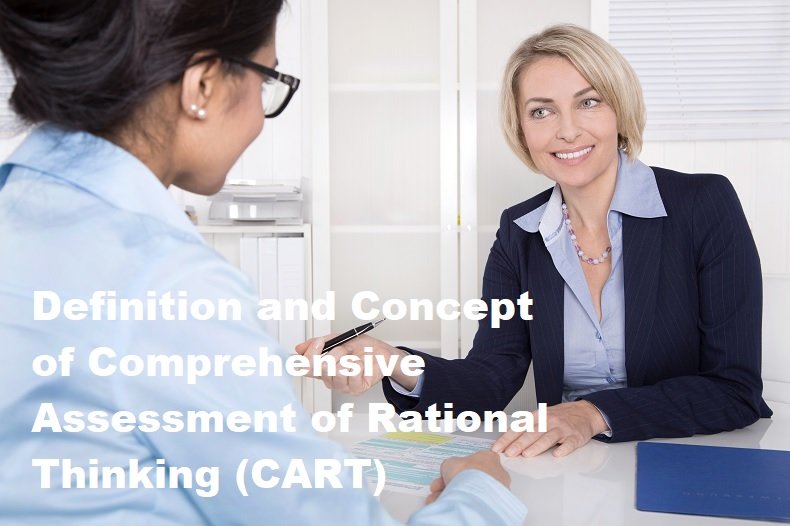Comprehensive Assessment of Rational Thinking (CART) is an assessment concept used to measure a person’s rational thinking ability. This assessment is based on the theory that rational thinking is an important component in individual success both in their personal and professional lives. CART is very important because it helps identify the level of efficiency, coherence and quality of a person’s thinking process. The history of CART begins with early studies on human thought processes carried out by psychologists since the beginning of the 20th century. One of the important figures in the development of this concept was Albert Ellis, an American psychologist and psychotherapist, who is known as the father of Rational Emotive Behavior Therapy (REBT). In his research, Ellis found that irrational thinking patterns can cause emotional disorders and maladaptive behavior.
The main goal of the Comprehensive Assessment of Rational Thinking (CART) is to objectively evaluate a person’s rational thinking capacity and differentiate between adaptive and maladaptive thinking patterns. In an educational context, CART can provide useful information for teachers and instructors to understand students’ abilities in dealing with situations that require problem solving, effective decision making, and critical abilities. By applying the Comprehensive Assessment of Rational Thinking (CART) in various situations, both in education and the world of work, individuals can be developed to improve their thinking abilities to be more rational. Additionally, future research may continue to expand the use and effectiveness of CART to help improve the quality of human thinking and create better solutions to existing challenges.
Main Components of CART
One of the main components in the Comprehensive Assessment of Rational Thinking (CART) is logical ability. Logical abilities are the basis of various ways of thinking, including induction, deduction, and decision making. Individuals with good logical skills tend to be able to identify patterns in existing data or information, and use these patterns to make accurate and precise conclusions. For example, in the business world, a manager who has sharp logical skills can analyze a company’s financial reports to identify trends that have the potential to help or hinder the company’s growth.
The second component in CART is argument evaluation. This ability involves the skill to assess information or claims before making a decision or expressing an opinion. Argument evaluation includes critical skills such as distinguishing fact from opinion, assessing the validity of arguments, and identifying the suitability of claims based on context and available evidence. Individuals with good argument evaluation skills will be more efficient in understanding complex issues and avoid bias in decision making.
Decision making is the third component in CART and is very important in various aspects of a person’s life. This ability includes the skill to consider various available options, assess the advantages and disadvantages of each option, and predict the consequences of each option based on the available information. Making rational decisions involves a combination of logical and emotional analysis, as well as being able to evaluate the extent to which the decision is in accordance with the goals or values held by the individual.
The final component in CART is problem solving. Problem solving is often a combination of the previous components and includes the ability to identify problems, formulate potential solutions, and test and implement those solutions effectively. Individuals with good problem solving skills generally have a creative and flexible mindset, and are able to adapt to a variety of different situations. They also tend to work well in teams, value others’ perspectives, and seek help when needed to reach the best solution for all parties involved.
Implementation and Assessment Process
The Comprehensive Assessment of Rational Thinking (CART) testing procedure begins with thorough preparation in order to measure an individual’s rational thinking ability effectively. Prior to testing, participants are expected to understand the instructions and purpose of the test. The test administrator must provide clear information regarding the test procedures, duration, and types of questions that participants will face. Sample questions on the CART test include various forms of questions to measure various aspects of rational thinking. This test includes questions that test formal logic, such as categorical syllogisms, and informal logic through causal generalizations or analogies. In addition, the questions also measure understanding of the odds, such as calculating odds or evaluating relevant information in the context of decision making.
The assessment strategy in the CART test is designed to identify the extent to which individuals are able to use rational principles when answering questions and solving problems. Score weighting is given to each part of the test according to the level of difficulty of the questions and their relevance in measuring rational thinking abilities. Each correct answer will provide a certain score, and the total score will be used to assess the individual holistically. After completing the CART test, participants will receive feedback regarding their rational thinking abilities, including the strengths and weaknesses identified during the testing process. This feedback can then be used by individuals to develop learning strategies and practices that are more effective in improving their rational thinking abilities. Next, the test administrator must ensure the reliability and validity of the test results in order to provide appropriate and accurate recommendations.
Benefits and Usefulness of Comprehensive Assessment of Rational Thinking
One of the main benefits is in the field of education. Through data from measurements using CART, teachers and educators can better understand students’ thinking abilities and identify their weaknesses and strengths in making decisions and solving problems. In this way, educators can design more personalized and effective teaching methods, so that students are able to develop the critical thinking skills needed to achieve success in the future.
Apart from that, the benefits of CART in the career world are also very significant. Data from measurements using CART can help job seekers and companies in the recruitment process. For job seekers, CART results show the level of rational thinking ability which can be an added value when applying for jobs. Meanwhile for companies, this data provides important information about prospective employees, such as their ability to make the right and quick decisions under pressure. Through this information, companies can recruit workers who suit their needs and create a dynamic and productive work environment.
Better, rational decisions are one of the main benefits of Comprehensive Assessment of Rational Thinking (CART). In everyday life, individuals are faced with various choices that affect their quality of life. By having an understanding of the level of rational thinking ability through CART, individuals can learn to make more careful choices and achieve their goals efficiently. This provides many benefits, such as gaining greater self-confidence and creating long-term success in various aspects of life.
Not only in education, career and daily decision making, the benefits of CART are also felt in broader decision making processes, such as in politics and business. Political leaders and company executives can use data measured using CART to conduct analysis and evaluation of policies and strategies to be implemented. With information about the rational thinking abilities of team members or candidates for office who will occupy strategic positions, leaders can form an effective team in facing challenges and making wise decisions to achieve common goals. Thus, the widespread implementation of the Comprehensive Assessment of Rational Thinking (CART) has a positive impact on societal development and economic growth in various sectors.









